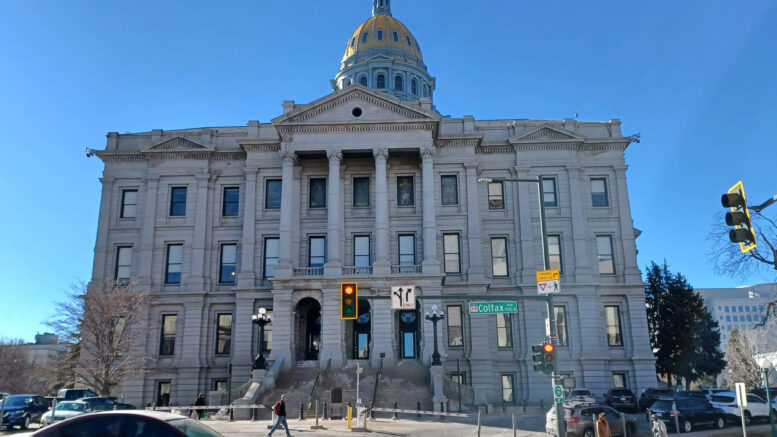Colorado legislators on the Joint Select Committee on Rising Utility Rates pressed witnesses during the panel’s first meeting Tuesday on how regulators might determine when requests for rate hikes would not be considered just or reasonable and when they might reject them.
The questioning comes as Xcel Energy consumers face natural-gas bills that are 75% higher than last winter and electricity bills that are up 25% over the past year, noted Erin O’Neill, chief economist for the Public Utilities Commission. Outreach to the PUC, the Office of the Utility Consumer Advocate and legislators also is up, which led to the creation of the committee to investigate charges at all utilities, though the panel focused most conservation on Xcel Tuesday.
Senate President Steve Fenberg, D-Boulder, emphasized at the beginning of the hearing that the purpose of the committee was not to vilify utility companies and that there were no preconceived outcomes for the hearings, which are expected to continue for the next month.
But Fenberg also noted that utilities are given government-sanctioned monopolies because of the state has determined that the most efficient number of companies competing in the high-cost space is one, and he said that requires officials ask more questions of them. The goal of the committee is to figure out if there is a way to stop the magnitude of rate hikes that Coloradans have seen over the past year, including asking whether shareholders of those utilities should share more of the burden of cost hikes falling on customers, he said.
“Have we lost track of what is truly a reasonable and necessary expense to provide electricity? I would say that if customers are having to choose between paying for heat and paying for prescription drugs, then, yes, we have,” Fenberg said to start the hearing. “If we’re going to have for-profit companies continue to provide public services, then I would say they’re worthy of more public scrutiny.”
Hearing focused on costs
Committee members then spent the next three-plus hours hearing from O’Neill, consumer-advocate office deputy director Joseph Pereira, Energy Outreach Colorado CEO/Executive Director Jennifer Gremmert and Colorado Energy Office Senior Director of Policy Keith Hay.
Most of the conversation on the first day of hearings revolved around the spiking energy bills that Coloradans are experiencing and how PUC members considered whether to allow increasing rates and pass-through costs for natural gas.
O’Neill, whose commission must approve rate hikes for both Xcel and Black Hills Energy, as well as for two other natural-gas companies, said the largest reason for bill increases was the significant boost in the commodity cost of natural gas. Utilities such as Xcel boost pass along the increased costs of gas directly to consumers when that happens.
But she noted too that usage of gas is up 30% and electricity usage is up 8% this winter because of colder temperatures. Also, she said, Xcel still is recovering deferred costs from Winter Storm Uri in 2021 and has received PUC permission to increase its base rates as it has upgraded its infrastructure recently.
Gov. Jared Polis announced a package of bills focused on clean-energy incentives on Wednesday. Polis has said repeatedly that the pricing volatility of natural gas is one reason he wants to generate more alternative forms of energy for use in Colorado.
Fenberg, Democratic Rep. Chris deGruy Kennedy of Lakewood and Democratic Rep. Matthew Martinez of Monte Vista pressed O’Neill on how the PUC determines what costs are just and reasonable and on whether the commission has rejected rate-hike requests as unreasonable. O’Neill noted that decisions are made after lengthy hearings in which the PUC hears from dozens of witnesses, and she said that each case typically results in some sort of rate hike, even if it may not be at the same level that the utility has requested.
At several points in the hearing, legislators seemed to be surprised at the amount of money that is spent by utilities in making their cases for rate hikes, some of which have come in response to new federal rules requiring them to upgrade their infrastructure. At one point, for example, Pereira answered a question from Fenberg by saying that Xcel recently spent $2.7 million on outside legal consultants making the case for an increase in its base rate for gas.
“So, a utility spends millions of our dollars for an outside consultant to help them increase our rates?” asked Fenberg. “That’s a pretty good deal.”
Xcel responds
In a statement to The Sum & Substance, Xcel noted that its regulatory process with the PUC is a legal process that may require expert witnesses brought by some intervening parties — parties that includes not only it but the Office of the Utility Consumer Advocates and the PUC. These costs are covered though customer rates, it noted.
Xcel, Black Hills and other providers will have an opportunity to offer their perspectives next week. Then on March 21, the committee will invite witnesses to present ideas on how to insulate Colorado consumers from cost increases, Fenberg said.
Despite the seeming focus on it and the increasing bills paid by its customers, Xcel said in its statement afterward that it’s looking forward to working with the committee to help policy makers and customers understand how the company delivers “nation-leading amounts of clean energy … with a focus on affordability and reliability for our customers.” It empathizes with customers, it added, over the volatility of the natural-gas market during an unusually cold winter, but it reiterated that the higher wholesale price of natural gas is passed directly onto customers without any markup from Xcel.
“We expect the outcomes of these hearings will reinforce the work that the state and Xcel Energy are already doing to protect our customers from the volatility of the natural gas market and give us the opportunity to find partnerships with our policy makers to expand programs and energy assistance for customers who need the additional help,” it said.
